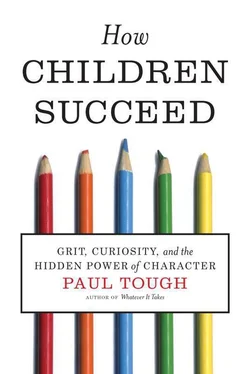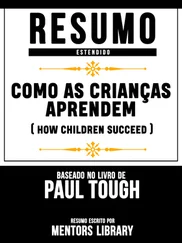But in the past decade, and especially in the past few years, a disparate congregation of economists, educators, psychologists, and neuroscientists have begun to produce evidence that calls into question many of the assumptions behind the cognitive hypothesis. What matters most in a child’s development, they say, is not how much information we can stuff into her brain in the first few years. What matters, instead, is whether we are able to help her develop a very different set of qualities, a list that includes persistence, self-control, curiosity, conscientiousness, grit, and self-confidence. Economists refer to these as noncognitive skills, psychologists call them personality traits, and the rest of us sometimes think of them as character.
For certain skills, the stark calculus behind the cognitive hypothesis—that what matters in developing a skill is starting earlier and practicing more —is entirely valid. If you want to perfect your foul shot, shooting two hundred free throws every afternoon is indeed going to be more helpful than shooting twenty free throws every afternoon. If you’re in fourth grade, reading forty books over the summer is going to improve your reading ability more than reading four books. Some skills really are pretty mechanical. But when it comes to developing the more subtle elements of the human personality, things aren’t so simple. We can’t get better at overcoming disappointment just by working harder at it for more hours. And children don’t lag behind in curiosity simply because they didn’t start doing curiosity drills at an early enough age. The pathways through which we acquire and lose these skills are certainly not random—psychologists and neuroscientists have learned a lot in the past few decades about where these skills come from and how they are developed—but they are complex, unfamiliar, and often quite mysterious.
This book is about an idea, one that is growing clearer and gathering momentum in classrooms and clinics and labs and lecture halls across the country and around the world. According to this new way of thinking, the conventional wisdom about child development over the past few decades has been misguided. We have been focusing on the wrong skills and abilities in our children, and we have been using the wrong strategies to help nurture and teach those skills. To call this a new school of thought is probably premature. In many cases the researchers adding to this growing store of knowledge are working in isolation. But increasingly, these scientists and educators are finding one another and making connections across the boundaries of academic disciplines. The argument they are piecing together has the potential to change how we raise our children, how we run our schools, and how we construct our social safety net.
If there is one person at the hub of this new interdisciplinary network, it is James Heckman, an economist at the University of Chicago. Heckman might seem an unlikely figure to be leading a challenge to the supremacy of cognitive skill. He is a classic academic intellectual, his glasses thick, his IQ stratospheric, his shirt pocket bristling with mechanical pencils. He grew up in Chicago in the 1940s and 1950s, the son of a middle manager at a meatpacking company. Neither of his parents was college educated, but they both recognized early on that their son possessed a precocious mind. At the age of eight, Heckman devoured his father’s copy of the popular self-help book 30 Days to a More Powerful Vocabulary, and at nine, he saved up his pennies and ordered Mathematics for the Practical Man from the back of a comic book. Heckman turned out to be a natural at math, more at home with equations than with anything or anyone else. As a teenager, for fun, he made a habit of taking long numbers and dividing them in his head into the prime numbers that made up their smallest factors—what mathematicians call resolving into primes. At age sixteen, he told me, when his Social Security number arrived in the mail, the first thing he did was resolve it into primes.
Heckman became a professor of economics, first at Columbia University and then at the University of Chicago, and in 2000 he won the Nobel Prize in Economics for a complex statistical method he had invented in the 1970s. Among economists, Heckman is known for his skill in econometrics, a particularly arcane type of statistical analysis that is generally incomprehensible to anyone except other econometricians. I sat in on several of Heckman’s graduate classes, and though I did my best to keep up, most of the lectures were, for a layman like me, all but impossible to follow, thick with bewildering equations and phrases like generalized Leontief functions and Hicks-Slutsky substitution elasticity that made me want to put my head down on my desk and just close my eyes.
Although Heckman’s techniques may seem impenetrable, the subjects he has chosen to focus on are anything but obscure. In the years since winning the Nobel, Heckman has used the clout and cachet the honor brought him not to cement his reputation within his field but to expand his pursuits, and his influence, into new areas of study that he previously knew little or nothing about, including personality psychology, medicine, and genetics. (He actually has a copy of Genetics for Dummies on his overstuffed office bookshelves, wedged in between two thick texts of economic history.) Since 2008, Heckman has been convening regular invitation-only conferences populated by equal numbers of economists and psychologists, all engaged in one way or another with the same questions: Which skills and traits lead to success? How do they develop in childhood? And what kind of interventions might help children do better?
Heckman oversees a group of two dozen mostly foreign-born graduate students and researchers scattered across a couple of buildings on the Chicago campus; they refer to their tribe, only half jokingly, as Heckmanland. Together, they’re always working on several projects at once, and when Heckman talks about his work, he jumps from one topic to another, equally excited by the monkey study in Maryland, the twin study in China, and his collaboration with a philosopher down the hall on the true nature of virtue. (In one conversation with Heckman, I asked him to explain how the various strands of his research fit together. Afterward, as his assistant was walking me out, she turned to me and said, “If you find out, let us know.”)
The transformation of Heckman’s career has its roots in a study he undertook in the late 1990s on the General Educational Development program, better known as the GED program, which was at the time becoming an increasingly popular way for high-school dropouts to earn the equivalent of high-school diplomas. In many quarters, it was seen as a tool to level the academic playing field, to give low-income and minority students, who were more likely to drop out of high school, an alternative route to college.
The GED’s growth was founded on a version of the cognitive hypothesis: the belief that what schools develop, and what a high-school degree certifies, is cognitive skill. If a teenager already has the knowledge and the smarts to graduate from high school, he doesn’t need to waste his time actually finishing high school. He can just take a test that measures that knowledge and those skills, and the state will certify that he is, legally, a high-school graduate, as well prepared as any other high-school graduate to go on to college or other post-secondary pursuits. It is an attractive notion, especially to young people who can’t stand high school, and the program has expanded rapidly since its introduction, in the 1950s. At the high-water mark, in 2001, more than a million young people took the test, and nearly one in every five new high-school “graduates” was actually a GED holder. (The figure is now about one in seven.)
Читать дальше



![Коринн МакКей - How to Succeed as a Freelance Translator [calibre 3.46.0]](/books/402693/korinn-makkej-how-to-succeed-as-a-freelance-transl-thumb.webp)








